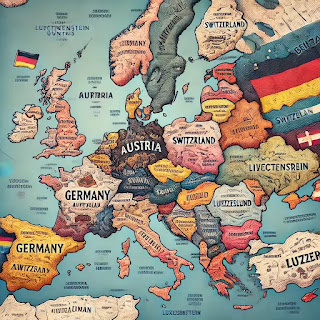A Glimpse into the History of German
The German language has a history that stretches back to the Early Middle Ages. Its roots lie in the West Germanic branch of the Indo-European language family, along with English and Dutch. Over centuries, it evolved through significant stages:
• Old High German (500–1050): Earliest records of Germanic dialects written in Latin script.
• Middle High German (1050–1350): The language of poets like Walther von der Vogelweide.
• Modern High German (1350–Present): A standardized form of the language heavily influenced by Martin Luther’s Bible translation in the 16th century.
Unique Features of the German Language
1. Alphabet and Special Characters: The German alphabet includes 26 letters from the Latin script, along with additional characters:
o Umlauts: ä, ö, ü
o The Eszett (ß): A unique letter used in certain words like Straße (street).
2. Compound Words: German is famous for its long compound words. For example:
o Donaudampfschifffahrtsgesellschaftskapitän: Captain of the Danube steamship company.
o These words reflect German's precision and descriptive nature.
3. Grammatical Cases: German uses four grammatical cases: Nominative, Accusative, Dative, and Genitive. These cases determine the role of nouns in a sentence, making the language structurally complex but logically consistent.
Why Learn German?
1. Career Opportunities: Germany has one of the largest economies in the world, and knowing German can open doors in industries like engineering, automotive, and healthcare.
2. Access to Rich Culture: German is the language of great thinkers and artists, from Johann Wolfgang von Goethe and Ludwig van Beethoven to Albert Einstein. By learning German, you gain direct access to works in literature, music, philosophy, and science.
3. Ease of Travel: With German as the primary language in multiple countries, it can significantly enhance travel experiences across Europe.
Tips for Learning German
1. Master Pronunciation Early: German has clear rules for pronunciation, unlike English. Focus on mastering umlauts and consonant sounds.
2. Learn with Context: Build vocabulary through context. For example, learn food-related words when cooking or grocery shopping.
3. Use Learning Tools:
o Apps: Duolingo, Babbel, or Memrise.
o Books: Use grammar guides like Hammer’s German Grammar and Usage.
o Videos: Watch German TV shows or YouTube channels like Easy German.
4. Practice with Native Speakers: Platforms like Tandem or italki can connect you with native German speakers for practice.
Suggested Image: A photo of a student using an app to learn German or a German dictionary.
Conclusion
Learning German can be a challenging but incredibly rewarding journey. It opens up a world of cultural richness, career opportunities, and personal growth. Whether you're drawn by the beauty of its structure, the logic of its grammar, or the charm of its literature, German is a language worth mastering.









No comments:
Post a Comment